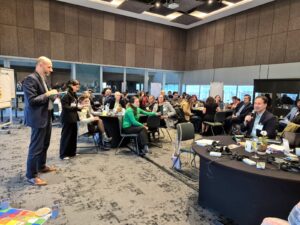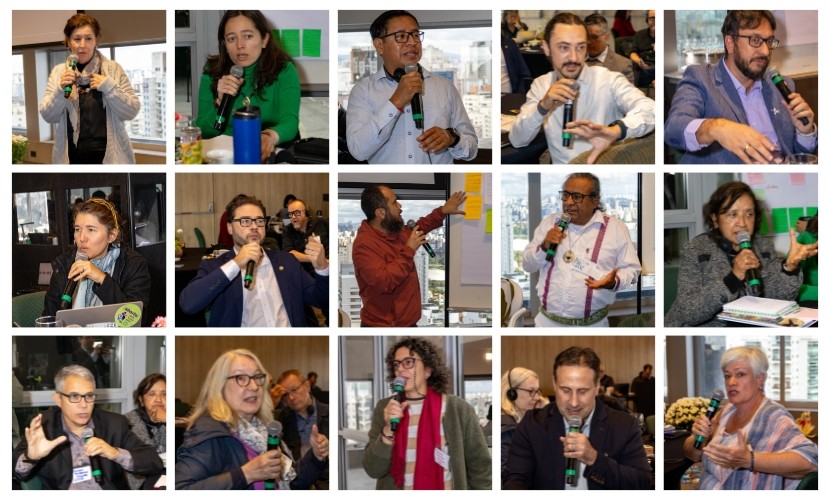The World Health Organization Traditional Medicine Global Library (WHO TMGL) was presented by João Paulo Souza, director of BIREME, as part of the program for the Regional Consultation for Prioritizing Research in Traditional, Complementary, and Integrative Medicine (TCIM), held on June 11 and 12 in São Paulo, Brazil. The event was organized by the Pan American Health Organization (PAHO), through its Departments of Health Systems and Services (HSS) and Social and Environmental Determinants for Health Equity (DHE), and its Latin American and Caribbean Center on Health Sciences Information (BIREME), together with the World Health Organization (WHO) through its Global Traditional Medicine Centre (GTMC). The objective of the presentation was to provide historical context and present the current stage of development of TMGL, in order to promote constructive dialogue and gather comments and suggestions from participants for improvement.

In his presentation, João Paulo Souza contextualized the origin and political milestones that drove the creation of TMGL, highlighting the growing appreciation of traditional knowledge in international forums, such as the BRICS and G20 Summits, both held in 2023, in South Africa and India, respectively. “The recommendation to strengthen traditional practices, followed by a financial donation from the Indian government to the WHO, contributed to the consolidation of the project,” said João Paulo. The initiative was then developed in partnership with BIREME, leveraging the Center’s expertise in building digital libraries—especially the MTCI Americas VHL, which covers the same field.
Currently in the pre-beta phase, TMGL is being implemented in stages until it reaches version 1.0, which is scheduled for release in December 2025, to be held during the 2nd WHO Global Summit on Traditional Medicines in India. The platform includes a global portal, six regional portals, and 194 country pages, as well as a series of thematic collections—such as Ayurveda and Traditional Midwifery—and specialized tools such as the “Traditional Index Medicus” (TIM), an integrated index of scientific journals and periodicals focused on TCIM. With approximately 1.7 million documents already integrated, TMGL will also offer access to databases, scientific publications, digital repositories, evidence maps (developed in collaboration with CABSIN and other partners), and artificial intelligence resources aimed at expanding access for managers, health professionals, TCIM practitioners, and people interested in topics related to TCIM.
A central aspect of the presentation was the participatory methodological approach adopted by the project team. Souza highlighted the use of digital tools and interactive dynamics to collect suggestions during the event, enabling participants to contribute directly with their assessment and targeted feedback for the improvement of the library. “This strategy reaffirms TMGL’s vision as a living platform, built on dialogue with experts and users, and guided by a long-term commitment inspired by the 27-year history of the VHL,” stated the director. The image below captures some of the participants during the activities.

Based on the participants’ contributions, Mirelys Puerta Díaz, product manager and focal point at BIREME for the development of TMGL, synthesized the main suggestions brought by the group discussions:
- Inclusion and accessibility: expanding translation resources and offering accessible formats and audiovisual materials, with culturally adapted interfaces for diverse audiences, including indigenous peoples and users with disabilities.
- Transparency and content organization: establishing clear criteria for curation, categorization by medical systems and authorship, and implementing advanced search filters by topic, country, and document type.
- Governance and social participation: creating representative editorial committees, participatory mechanisms for consultation and content validation with local stakeholders, and spaces for collaborative knowledge building.
- Valuing local knowledge: promoting documentation of best practices, life stories, and community experiences in traditional health, with an emphasis on practical application and impact on public policies.
- Sustainability and technical improvement: improving browsing experience, ensuring periodic updates, and developing financing and digital training strategies, especially aimed at contexts that are difficult to access.
Díaz adds that transparency components are already being incorporated into the current stage of product development through the agile approach of the Scrum framework, which has enabled incremental deliveries with a continuous focus on value and centered on user interest and experience. “By adopting this management methodology, we have enabled agile responses to emerging needs, ensuring that TMGL evolves in a structured way, based on active listening and co-creation with users, TCIM experts and stakeholders,” explained Mirelys.
The Regional Consultation for Prioritizing Research in TCIM in the Americas was held as part of a broader WHO initiative aimed at strengthening evidence-based practices in different regions of the world. The goal is to promote more effective integration of these practices into health systems, anchoring them in intercultural dialogue. In this context, TMGL stands out as one of the main pillars of the strategy, by offering a robust, inclusive digital environment that is sensitive to the plurality of knowledge and to the different policies related to traditional health globally.